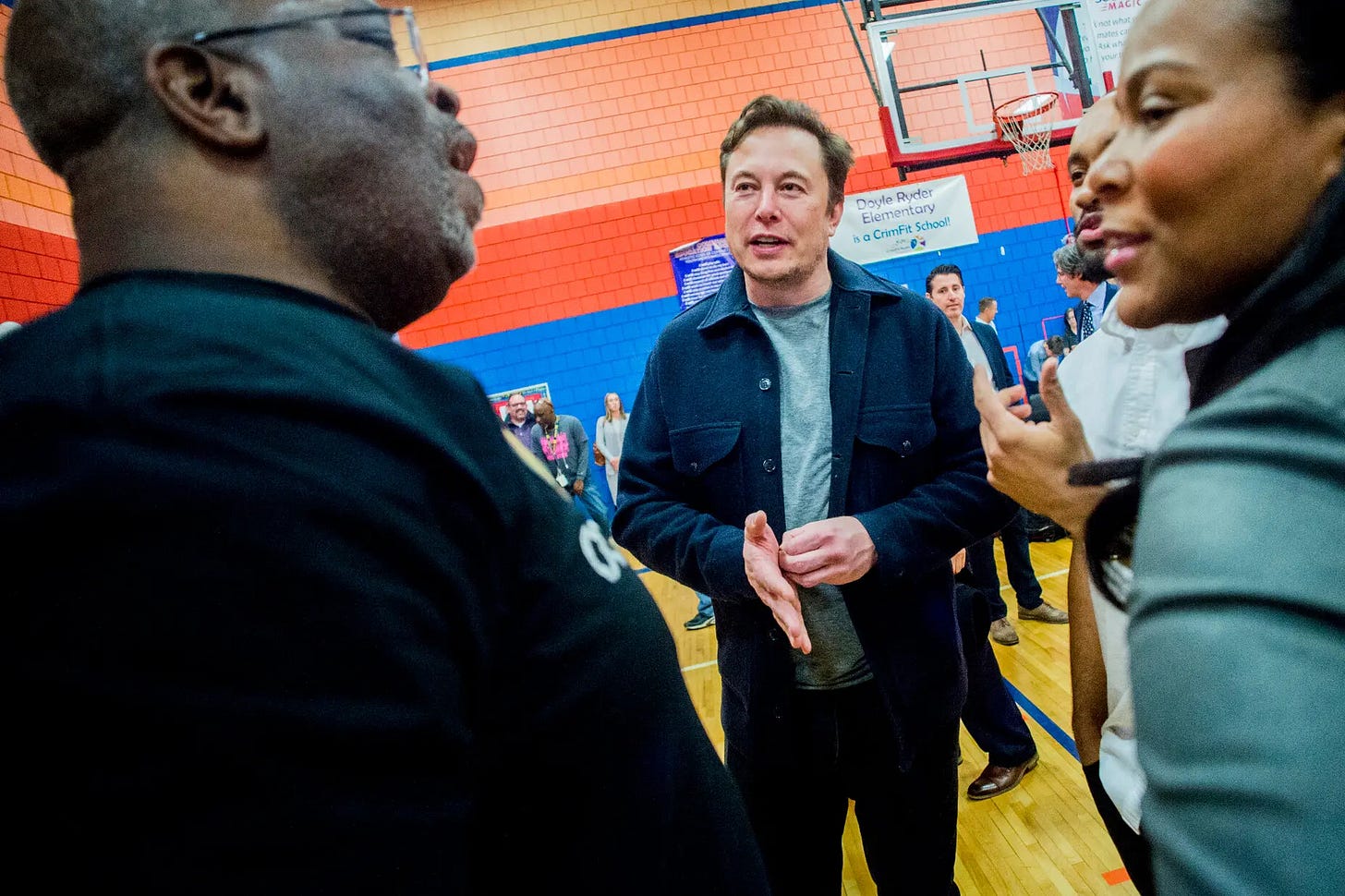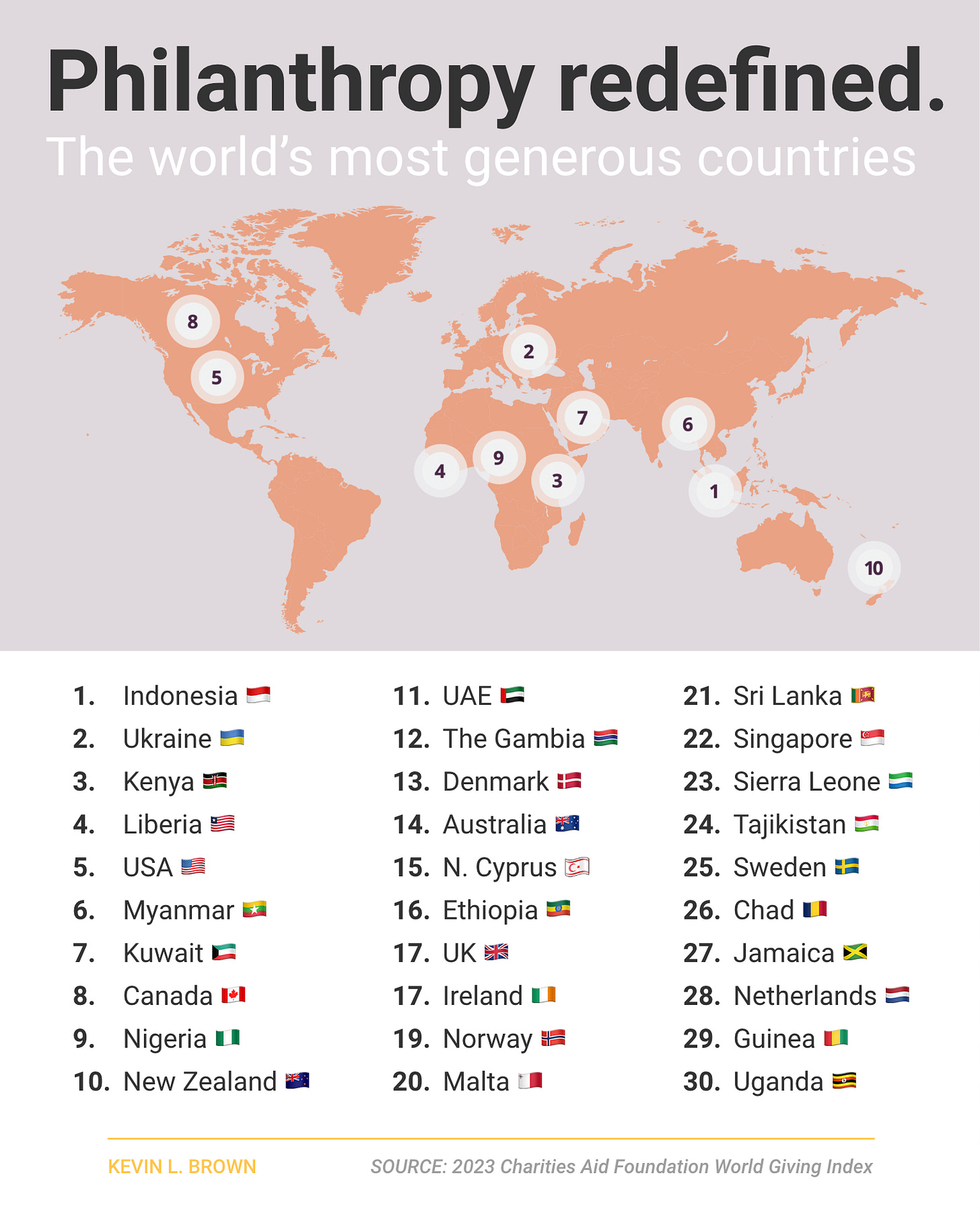Philanthropy redefined — the world’s most generous countries.
Money has hijacked philanthropy.
Because generosity doesn’t require wealth.
And many ‘poorer’ countries in the Global South give more than ‘rich’ Global North nations.
Just look at the World Giving Index:
🇮🇩 Indonesia tops the list for the sixth year in a row, with 82% of adults donating money.
🇺🇦 Ukraine, 🇰🇪 Kenya, 🇱🇷 Liberia, 🇲🇲 Myanmar, and 🇳🇬 Nigeria are also the world’s most generous. So low- and middle-income countries are six of the top 10.
🌍 Africa also boasts 🇬🇲 The Gambia, 🇪🇹 Ethiopia, 🇸🇱 Sierra Leone, 🇹🇩 Chad, 🇬🇳 Guinea, and 🇺🇬 Uganda in the top 30 for the highest levels of giving.
🇪🇺 No Western European country made the top 10. And the (relatively wealthy) continent only has three nations in the top 15 — less than Africa.
🇺🇸 USA is the sole Global North power in the top seven.
🇬🇧 The UK ranks just 17th most generous in the world. It’s third in donating money, but a paltry 58 in volunteering and 112 in helping a stranger.
👍🏾 Across the globe, immigrants are more likely to give than nationals.
Why does this data matter? ⤵
Because the word philanthropy means love (phil) of humanity (anthropos).
Not love of grantmaking.
So once again, we find a narrative that’s been co-opted by the Global North. And once again, we have a storytelling opportunity.
A chance to shatter the illusion of the Global South’s dependency.
A chance to rebrand philanthropy.
“Sixteen years in the field have shown me that actual philanthropists … are much more prevalent among the regular population and are only rarely found inside the field’s formal institutions,” says Edgar Villanueva in his book Decolonizing Wealth.
This true definition of philanthropy should be a wake-up call for donors. To fully embrace the love of humanity. To go beyond the grant. To give nonprofits time, tools, and treasure — like the world’s most generous people do.
In other words, many of us already practice real phil-anthropos.
Sending remittances back home.
Donating money to charity.
Helping out a stranger.
Volunteering time.
All philanthropy. ☝🏽
“What the World Giving Index shows is that the act of giving exists in all societies,” says Charities Aid Foundation. “CAF has consistently called for governments, policy makers, and international funders to ensure the building blocks are in place to enable cross-border giving and local giving structures to build sustainability.”
Because generosity isn’t a VIP club.
Cash isn’t the only ticket in.
Philanthropy is an ethos.
Not a financial transaction.
So if we monetize the story of giving, we risk bankrupting its very soul.
And a brand of philanthropy that disregards the Global South’s generosity isn’t just flawed.
It’s incomplete.
The narrative is ours to rewrite.
💪🏽💛
The Daily Bonus

In a World Giving Index where so many with so little give greatly, it’s hard not to find a stark contrast in this story:
Elon Musk — Forbes’ second richest person in the world — is a philanthropic fraud.
Check out the new, blockbuster analysis in the New York Times: Elon Musk Has a Giant Charity. Its Money Stays Close to Home.
In the piece, reporters found in his 2021 and 2022 (lack of) giving:
Musk has given away less than one percent of his rocketing fortune since signing the Giving Pledge some 11 years ago.
About half of the donations had some link to Mr. Musk, one of his employees or one of his businesses.
His 2021 donation of Tesla shares to the Musk Foundation granted him federal tax benefits that auspiciously maximized how much adjusted gross income (30 percent, or $4.6 billion) he’d be allowed to deduct from his tax bill.
And more.
“The more you read, the more egregious[ly Elon] things get,” says The Charity Reformer. “His Foundation boasts the nation’s fourth-largest shortfall in meeting its paltry five percent payout requirement; after Tweet-pledging to fix Flint, Michigan’s water system, Musk tossed over a paltry million before totally disengaging.”
“This public diagnosis of Musk’s Narcissistic Philanthropy Disorder isn’t just enjoyable because we’re petty. His example is instructive, notes Cantor, because ‘we’re now facing a perfect storm of factors driving charitable misdealing into hyperdrive.’”


